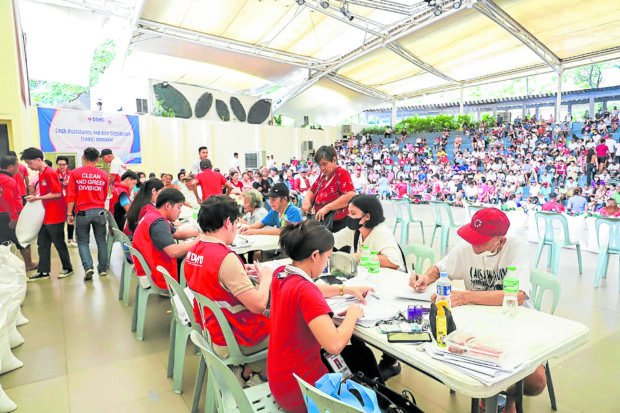
ASSISTANCE PACKAGE | Personnel of the Department of Social Welfare and Development (DSWD) in Valenzuela City process applications for rice and cash aid submitted by beneficiaries during the launching of that program on Sunday led by the DSWD and the House of Representatives. (Photo from the Facebook account of Social Welfare Secretary Rex Gatchalian)
MANILA, Philippines — A minority lawmaker, 1-Rider Party-list Rep. Ramon Rodrigo Gutierrez, questioned on Wednesday the criticism received by the government’s new cash aid program for the near-poor, calling it a “welcome” budget insertion like the Libreng Sakay program.
According to Gutierrez, members of the minority were also surprised that an item — the Ayuda sa Kapos ang Kita Program (AKAP) — was inserted at the bicameral conference committee for the then-proposed 2024 national budget.
“When we first learned about the news of an inserted item, we were surprised because we’d like to think that our role in the minority is to finalize the budget. But upon checking, we immediately asked the secretariat, and we learned that this is an insertion in the bicam, so there’s participation on both the parts of the House and the Senate,” Gutierrez said in a mix of English and Filipino in a press briefing at the House.
Why link it to people’s initiative?
He added that he did not understand why AKAP was being linked to the people’s initiative (PI) for Charter change, noting that not all insertions at the bicam were borne out of evil intentions.
Gutierrez brought up the Libreng Sakay initiative, a program during the height of the pandemic when the government provided free public transportation rides to commuters.
“So, with such a laudable intention, I don’t know why this would be linked with PI. Perhaps by timing, but I really think it’s unfortunate. It does not mean that insertions in the bicam have bad intentions. I hope we can do away with putting malice to that,” he said.
“Speaking for our sector, for example, the Libreng Sakay, which is not actually a regular program — but a service contract program. But when they released that, you could call it insertion, but it is a welcome initiative for us. So I hope we can do the same and welcome AKAP because we do believe that it has a good objective,” he added.
Questioned at Senate
In a Senate hearing on Tuesday, Sen. Imee Marcos questioned AKAP, saying it was unknown to senators, especially to her, since she sponsored the 2024 budget of the DSWD when it was still being deliberated.
Marcos also speculated that the AKAP funds were used to entice people into signing in favor of people’s initiative campaign to amend the Constitution, which some senators believe was being orchestrated by House leaders.
READ: DSWD defends AKAP: ‘We don’t create magical projects’
READ: Magic project? Gonzales says Senate approved funding for AKAP
READ: Sen. Imee Marcos eyes separate probe for DSWD cash aid
Several House officials have already called out Marcos for her claims, with Ako Bicol party-list Rep. Elizaldy Co saying that the senator was tarnishing the pure intentions of AKAP.
Senior Deputy Speaker Aurelio Gonzales Jr., during the same briefing where Gutierrez spoke, also revealed that Marcos signed the exact page in the General Appropriations Bill that contained provisions for the P26.7-billion AKAP.
Gonzales also said that the 2024 budget was approved by the Senate on November 28, 2023, obtaining 21 affirmative votes.
The House and the Senate have been at odds recently due to discussions about amending the economic provisions of the Constitution.
Last December, Speaker Ferdinand Martin Romualdez and Gonzales brought up the possibility of hearing Charter change proposals again to open restrictive economic provisions in the Constitution.
However, Gonzales said they may entertain Charter change through a people’s initiative because Resolution of Both Houses (RBH) No. 6 was not acted upon by the Senate.
But after the people’s initiative gained traction, the Senate accused the House of being behind the campaign, even claiming that it intended to abolish the Senate by introducing joint voting in deciding on the proposed constitutional amendments.
Romualdez and other House leaders have denied being behind the initiative, saying several times that they did not intend to abolish the Senate.
Several lawmakers also reiterated that they were willing to pursue amendments through a constituent assembly as contained RBH No. 6 — where two Houses of Congress would vote separately.